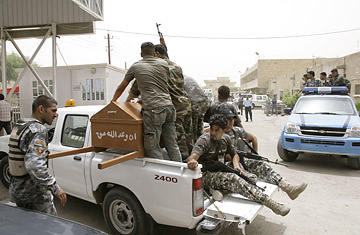
U.S.-allied fighters collect the body of a comrade who was killed in a suicide bombing in Baghdad's Huriya neighborhood.
A car bomb during the evening rush in a northwest Baghdad neighborhood of Huriya on Tuesday evening wrought spectacular damage to a bustling market. According to one eyewitness, stalls and shop-fronts were completely blasted away and rescue workers were struggling to attend to 56 killed and 87 wounded, according to the Iraqi Ministry of Health, while lamentations, screaming and vows of vengeance filled the air. As of the following morning, the Ministry of Interior said it was still struggling to arrive at a final casualty count.
The bombing, the worst violence that Baghdad has seen in three months, is a sharp jolt to a city where confidence was running high after a long run of relative stability, and it serves as a stark reminder of just how fragile the sectarian peace here is.
Predominantly Sunni before the U.S.-led invasion in 2003, Huriya became one of the most vicious scenes of Iraqi-on-Iraqi violence in the urban chaos that followed, with night-roaming Shi'ite militias eventually gaining the upper hand, either killing or expelling most of the Sunni population. During this period, a Shi'ite death squad executed the head of the Bata tribe, a Sunni clan prevalent in the neighborhood.
According to one eyewitness tonight, a car with four women occupants was somehow allowed into what is otherwise a vehicle-restricted market area. The women parked the car; they all departed; and the auto then detonated in a massive flash of heat, light, noise and destruction. The bombing may have been timed to coincide with a meeting at a nearby military base just 150 meters from the blast site, between U.S. forces and the Sunni leaders who used to be in charge of the area. If those attendees were the true targets, the bomb may have been intended as a sign that the Shi'as who now occupy Huriya have no intention of ceding any territory. A U.S. spokesman has identified Haydar Mehdi Khadum al-Fawadi, the leader of a local Shi'ite extremist group, as the top suspect. In an email to the Associated Press on Wednesday, he wrote, "We believe he ordered the attack to incite violence against Sunnis; that his intent was to disrupt Sunni resettlement in Hurriyah in order to maintain extortion of real estate rental income to support his nefarious activities."
Until tonight's bombing, sectarian strife had been declining dramatically, and optimism was in rich supply. According to the Associated Press, at least 532 Iraqi civilians and security troops were killed last last month. That is the lowest monthly total this year, and far below April's tally of 1,080.
Among the reasons credited for the dramatic decline in violence in Baghdad and throughout Iraq over the past year has been the U.S. Army's successful bids to convert many Sunni tribes from insurgents to allies by paying the tribes to establish their own "Sons of Iraq" security details. To varying degrees, however, many Shi'as, ranging from radical militias to several factions within the Shi'a-dominated government, have been displeased with the Sunnis' return to a position of prominence and power.
Delicately balancing this tension remains one of the United States' most pressing priorities. Bombings like this are designed to be provocative, to goad the victims into reprisals, and to unleash a cycle of violence that culminates in social and governmental instability. The question now is: Will it?
